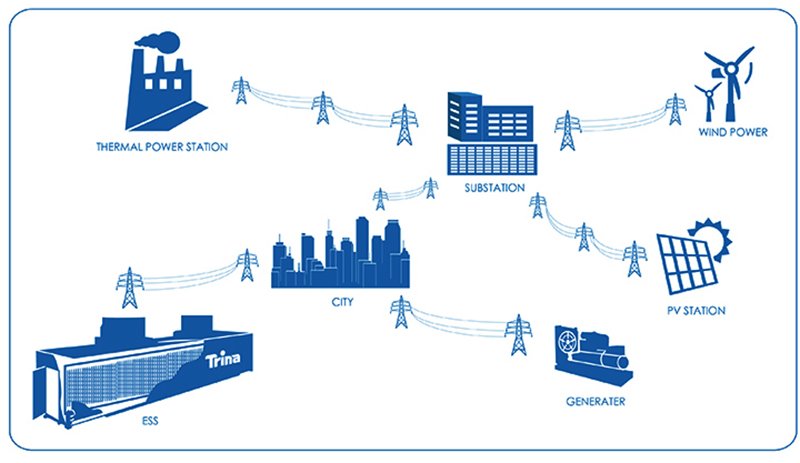
This is the second part of the article: Leading Special Forces for Sustainability, A Conversation with Mr. Peter Bakker, President and CEO of the World Business Council for Sustainable Development
Up to this point in human evolution, nations have developed their economy, wealth, infrastructure, and society on the back of cheap energy. It is no surprise that developed nations place enormous utilitarian value to electric power. It has become intrinsically linked to our existence and the protection of human health and the environment.
But it seems our evolution with electricity (and energy in general) has come full circle. Hundreds of years ago, businesses and communities sprouted up where they could put energy to work for them. We settled near rivers for hydropower, or took advantage of wind, sun, or other natural resources. Now considered a relic of past industrialization for many communities, combined hot water and steam systems once provided localized thermal and water resources in an efficient manner. When we realized that we could move electronics of power and molecules of water over long-distances using pipelines and wire, we thought it was more economical to create centralized power and water facilities.
A Century later we have begun to see once again, the merits of localized, efficient, right-sized power production. The design, development, and deployment of microgrids now provide a solution to address requirements for affordable, reliable, clean, and local dispatched and managed power. As our economy and society has matured we’ve realized that economies of scale only result in cost savings and societal benefits only to a nominal degree.

As global population continues to grow, as natural resources become constrained, as urban areas densify population, and as society continues to wrestle with adapting to the impacts of climate change, our new reality is that traditional economic theories are being challenged, and that the basic principles of physics and common sense are reinserting themselves into the economic realities of daily life.
Sustainable development has had many challenges in achieving scale in recent years, not because of monetary or technological barriers, but because of entrenched human error in how we establish priorities, mobilize political will, achieve bilateral agreements, and ultimately, take action. Mr. Bakker reflected, “COP15 in Copenhagen was a wake-up call for many governments, NGOs, and global business leaders.”
He continued, “Although barriers remain with scaling finance, technology, and policy solutions for larger scale infrastructure projects such as carbon capture, where we can pragmatically make the most significant advances are in leadership and personal commitment, not just from a handful of committed CEOs, but from a generation of executives that mobilize to take action, ahead of capital market pressures.”
As an example, Mr. Bakker applauded the work of Unilever who since 2009, has been working with the Rainforest Alliance, Forest Stewardship Council, the Tropical Forest Alliance 2020 and other stakeholder groups to put into place sustainable supply chains and sourcing practices toward eliminate deforestation. Deforestation accounts for nearly 15% of total greenhouse gas emissions. Unilever has committee to achieve zero net deforestation by 2020 across five of their key commodities: palm oil, soy, paper and board, beef, and tea.
Mr. Bakker noted that within two years of announcing their 2020 forestry commitment, the forest stewardship practices of many Unilever suppliers began to change dramatically. He said that more of these kinds of successes are possible when stakeholders team up to define mutual goals, establish and continually reinforce trust, and act with sincerity and integrity.
“This is where the WBCSD fits in, provides value,” added Mr. Bakker. “Too often we see business asking for the policy or agreement to be put into place, and pointing the finger at government for acting to slow; or we see government pointing the finger at business saying do something, innovate, accelerate technology adoption. The WBCSD is working hard to foster a healthier, more productive dialog. By breaking down these barriers to collaboration, we strive to bring a common narrative the stakeholders buy into, so that they can leverage their unique skill sets, capabilities, and interests and see where they contribute to mutual objectives. This process is essential to success, and in our experience works very well.”
No matter what label you give it (circular, blue, green, cradle-to-cradle, sharing, upcycling, downcycling, closed-loop, eco-efficient, regenerative), a new and more enlightened economy has emerged. Different models and approaches for taking stock of and valuing the priorities of this generation (i.e., human health, environment, safety, security, innovation, material flows, natural resource damages, ecosystem services, and a myriad of other factors) are now quantified and entered as hard assets or liabilities into the spreadsheets for major banks, corporations, NGOs, and governments. As systems-thinking further infiltrates the cost of capital, updated models of doing business, and altogether new products and services, will compete with the traditional economic approaches that constrain this generation from achieving sustainable development.
“Ultimately we know what we need to do. We need provide an integrated teaming approach to sustainable development. We find there a lot of CEO’s that want to be part of something larger than themselves and their company. They want to put their name and resources to task to address specific sustainability priorities. Our goal is to help them realize that passion by prioritizing the needs so that their resources can be directed to those tasks which they can have the greatest impact.”
Mark Coleman is a recognized voice, business advisor and consultant on the convergence of sustainability, environmental stewardship, energy, technology, and innovation.
Mr. Coleman is an active blogger with the Huffington Post, and has published numerous articles with leading organizations including GreenBiz.com, Environmental Leader, Triple Bottom Line Magazine, among others.
Mr. Coleman is the President of Convergence, Mitigation, Management (CMM) LLC, which provides custom business intelligence and advisory services for business, government, applied research, not-for-profit, and non-governmental organizations.
Mr. Coleman has advised hundreds of organizations in the areas of sustainability, risk, innovation, operational effectiveness, and business strategy. Much of this work led Mr. Coleman to write and publish two books, Time To Trust: Mobilizing Humanity for a Sustainable Future (Motivational Press 2014, www.timetotrustbook.com) and The Sustainability Generation: The Politics of Change and Why Personal Accountability is Essential NOW! (SelectBooks 2012, www.thesustainabilitygeneration.com) both of which highlight his perspective on holistic systems-level logic and theory for advancing humanity beyond the status-quo toward more integrated and mutual models of sustainable development.
Mr. Coleman currently serves on the board of the Sustainable Manufacturer Network (http://sustainablemfr.com/), and on the board of a not-for-profit organization, B9 Plastics (www.b9plastics.org) involving global water development concerns.
Mr. Coleman resides in the Finger Lakes region of New York with his wife Aileen and two sons, Owen and Neal.
Web:
Website: www.timetotrustbook.com
Twitter: @TheSustainGen











